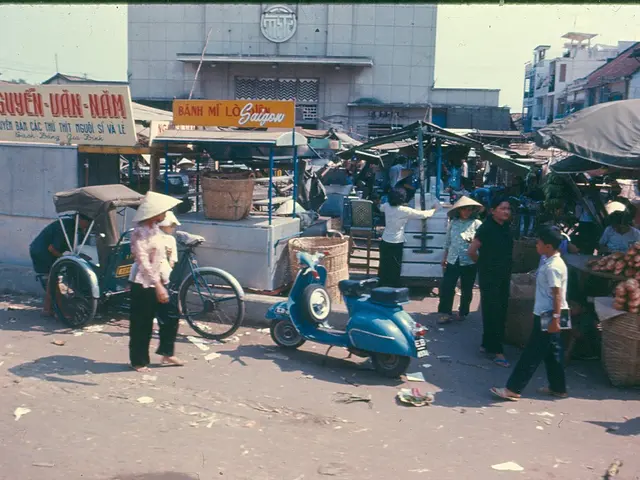Advance Deployment of Election Observers Anticipated Ahead of Crucial Parliamentary Elections in Georgia
Parliamentary Elections in Georgia: Fairness Concerns Loom Amid Monitoring Efforts
The stage for Georgia's parliamentary elections on October 26 is set, with the political landscape fractured and confidence in a fair contest questionable. International observers and local counterparts are preparing to scrutinize the voting process intensively to ensure integrity amid fears of electoral irregularities.
The polls are crucial for Georgians, as the fairness of the proceedings will significantly influence the acceptance of the results. With voter polarization at an all-time high, the election's outcome is likely to hinge on perceptions of a fair electoral process.
Both the incumbent Georgian Dream party and the opposition have sought to project an air of inevitability surrounding the elections. The incumbent party has downplayed concerns of a potential defeat, attributing this confidence to their rule amid an unpopular European Union breakup this year, while the opposition sees an opportunity to unseat a government they perceive as authoritarian.
Polling data has fueled uncertainty, with conflicting results that leave the voter base divided. Polls commissioned by government-leaning sources estimate support for the party at nearly 60 percent, while another study by an opposition-affiliated TV station indicates 30 percent of Georgians would vote for the incumbents.
International observers and numerous local monitoring groups have been assessing the Georgian political landscape ahead of the elections. The OSCE initiated an election observation mission on September 12, comprising 30 long-term observers and hundreds of short-term observers. Local monitoring initiatives led by organizations like the Georgian Young Lawyers Association (GYLA) have already reported oncases of political violence and intimidation during the campaign.
Reports have surfaced about instances of violence and intimidation, such as the August 11 attack on the co-chair of the Ahali political party, Nika Melia, during a meeting with journalists. Another report detailed allegations of voter repression in the city of Rustavi in October, where Georgian Dream officials have been accused of seizing IDs from local individuals potentially deterring them from voting.
These incidents underscore the charged, tense political climate that Georgia faces on the eve of the elections. Lévan Natroshvili, deputy executive director for the International Society for Fair Elections and Democracy (ISFED), dismisses these incidents as nothing new, as the organization has recorded similar violations in recent years.
Should any attempts be made to manipulate the elections, the widespread presence of observers from local and international monitoring groups makes such tampering less likely to go undetected. Georgian election monitors have already been on the ground for months, strategizing to send observer teams to polling stations to document any irregularities.
However, challenges remain, such as controversial legislation on foreign agents, which has made the work of election monitors more difficult due to recruitment issues and stigmatization. In some regions, notably Samtskhe-Javakheti and Kvemo Kartli, which have high numbers of ethnic Armenians and Azeris, respective, recruitment issues have been reported.
Election monitors have also faced various forms of harassment, with the most high-profile example being the September 24 restrictions imposed by the Anti-Corruption Bureau on Transparency International. The bureau alleged the organization was campaigning for specific political parties while urging voters to abstain from supporting another party. Following a public outcry, Prime Minister Kobakhidze urged the Anti-Corruption Bureau to reverse its decision, leading the bureau to lift the restrictions, allowing Transparency International to resume monitoring.
As the campaign enters its final stages, independent monitoring organizations like ISFED are stationing observers at polling locations to verify the results of summary protocols. Other organizations, including the Georgian Young Lawyers Association and Transparency International, will evaluate the integrity of polling stations.
Regardless of the exact outcome on election day, independent monitoring organizations will compile reports detailing their findings and recommendations. Depending on the results, opposition parties may seek to challenge the results in court, potentially igniting protests mirroring those earlier this year in response to the adoption of the "foreign agents" law.
Georgia's October 26 parliamentary elections promise to be closely watched by international observers, who will scrutinize the fairness of the process and provide recommendations to prevent future irregularities and strengthen Georgia's democratic standing.
- The news about the parliamentary elections in Georgia raises concerns about the fairness of the electoral process, given the political landscape's fragmentation and the high levels of voter polarization.
- In the General-News, there have been reports of cases of political violence and intimidation during the campaign, which have heightened concerns about the integrity of the elections.
- The environment surrounding the elections is charged and tense, as both the incumbent party and the opposition aim to project confidence and seek to sway public opinion, with international observers closely monitoring the political landscape in Georgia.








